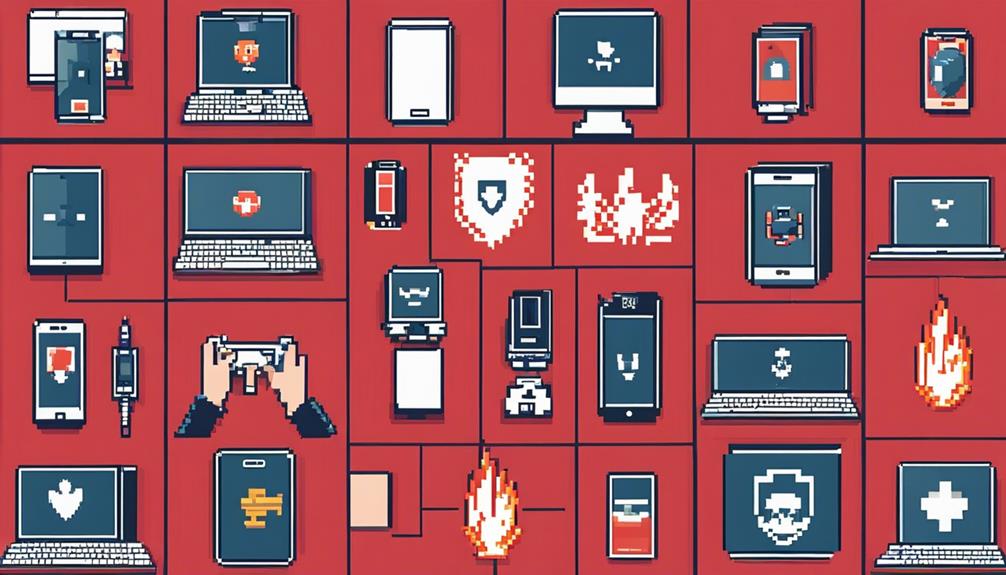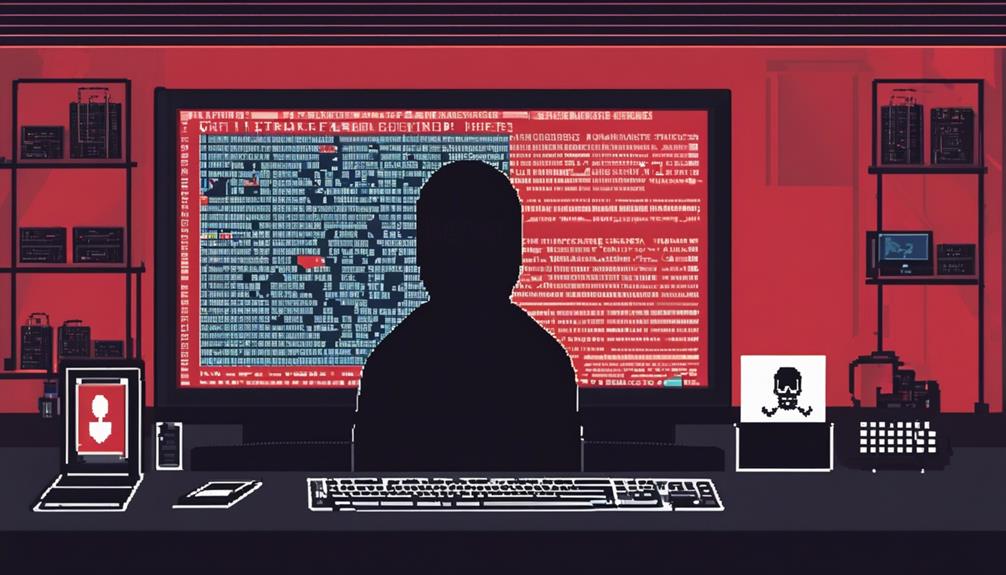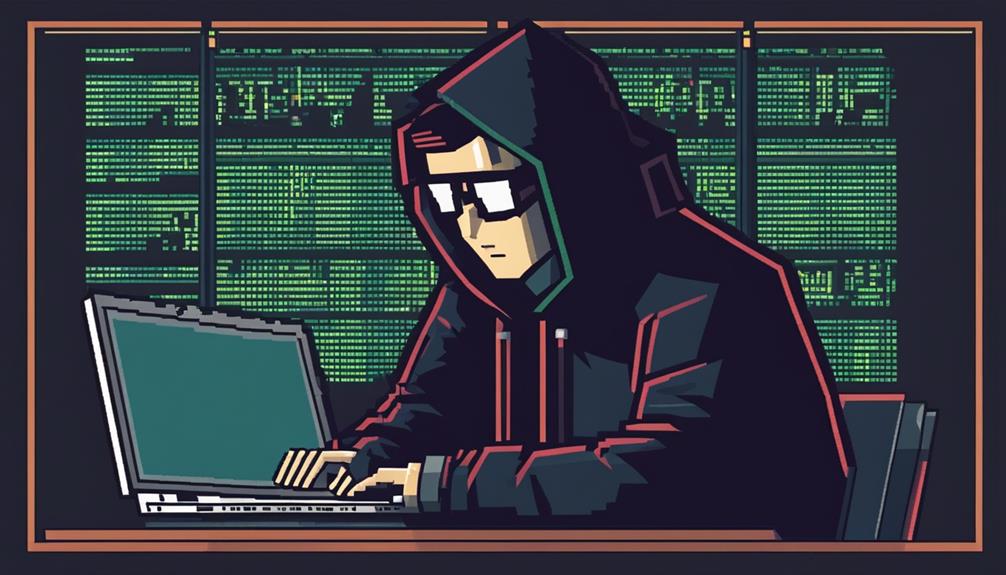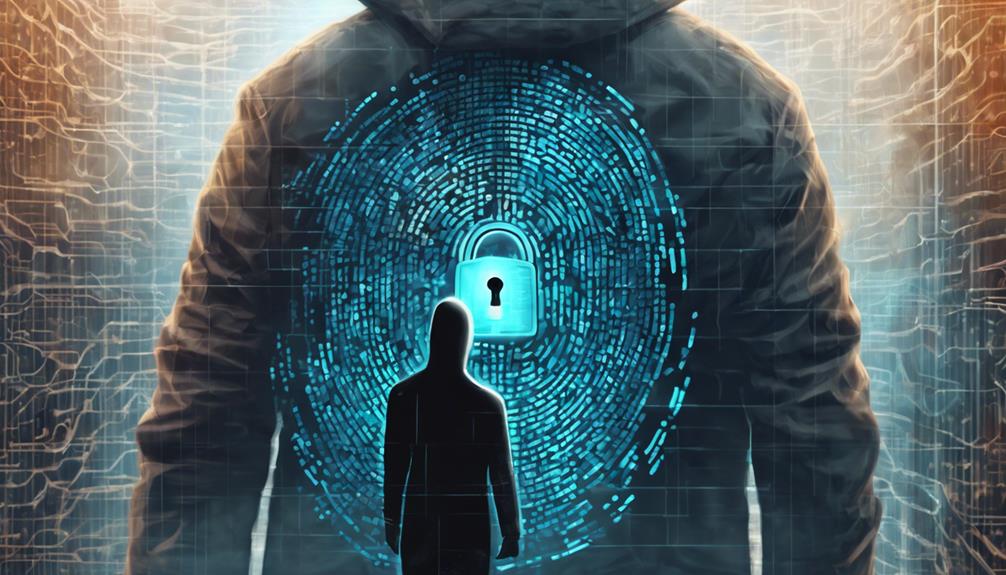To protect your internet identity from hackers, use strong, unique passwords for each account, and change them regularly. Be cautious of phishing attempts by not sharing personal information unless verified. Secure devices with firewalls to prevent unauthorized access and install updated antivirus software. Regularly monitor online activity for any suspicious signs of compromise. Stay vigilant against identity theft by safeguarding personal information and customizing privacy settings. By following these essential tips, you can greatly enhance your online security.
Key Takeaways
- Use strong, unique passwords for each account.
- Beware of phishing scams and suspicious emails.
- Implement robust firewall protection on devices.
- Utilize reputable antivirus software for online security.
- Regularly monitor accounts and adjust privacy settings.
Strong Passwords for Online Accounts
Utilizing complex and unique passwords for your online accounts is essential in safeguarding your internet identity from potential hacking threats. When creating passwords, make sure they consist of a mix of letters, numbers, and symbols to enhance security.
It is important to use unique passwords for each online account to prevent hackers from gaining access to multiple accounts if one is compromised. Additionally, changing passwords regularly can greatly reduce the risk of unauthorized access.
To help manage multiple passwords securely, consider using a password manager, which can store and organize your login credentials effectively.
A strong password acts as a barrier against cyber threats, protecting your personal information and sensitive data from malicious actors. By implementing these password best practices, you can strengthen your online security and reduce the likelihood of falling victim to hacking attempts.
Beware of Phishing Attempts

Protecting yourself from phishing attempts is vital in safeguarding your online identity and financial security. Phishing is a deceptive practice where scam artists impersonate trustworthy entities to trick individuals into revealing personal information, leading to identity theft and financial loss. These fraudulent emails or messages often appear authentic, prompting victims to disclose sensitive details like passwords or account information.
It's important to remember that legitimate organizations typically do not request such information through unsolicited means. To avoid falling prey to phishing scams, never provide personal details unless you have initiated the contact. Be cautious of any requests to verify account information or passwords, as these could be attempts to compromise your online identity.
Secure Devices With Firewalls

Implementing robust firewall protection is essential for securing your devices against potential cyber threats. Firewalls act as a barrier by monitoring and controlling incoming and outgoing network traffic, whether hardware-based in routers or software-based on individual devices, to prevent unauthorized access.
These security tools analyze data packets and apply predefined security rules to decide if the traffic should be allowed through, effectively blocking malware, hackers, and other cyber threats. By regularly updating and configuring firewall settings, you can guarantee excellent protection against evolving dangers in the digital landscape.
Firewalls are critical in safeguarding your device and network integrity, as they serve as the first line of defense against cyber attacks. Remember, maintaining a strong firewall is key to enhancing your overall cybersecurity posture and keeping your sensitive information safe from malicious actors seeking to exploit vulnerabilities in your system.
Install Antivirus Software

To strengthen your device's defenses further, consider installing antivirus software as a critical measure in safeguarding your internet identity from potential cyber threats.
Antivirus software acts as protection software, guarding against online threats like viruses and malware. It scans your device, detecting and removing malicious software that could compromise your personal information. It is vital to update regularly to guarantee your antivirus software can effectively combat the latest threats.
Additionally, antivirus programs offer real-time protection, actively monitoring your online activities to prevent any potential risks. By installing reputable antivirus software, you take a proactive step towards securing your internet identity from hackers.
Regularly Monitor Online Activity

To maintain your online identity secure, it's essential to regularly monitor your accounts for any signs of compromise. This includes checking your privacy settings frequently to make sure that your personal information is protected.
Monitor Accounts for Signs of Compromise
Regularly monitoring your online accounts for any signs of compromise is essential to safeguarding your internet identity from hackers. Identity thieves often target financial information, so keeping a close eye on your accounts can help prevent unauthorized access.
If you notice suspicious links, unrecognized logins, or unfamiliar account activities, it could be a sign that your account is hacked. By regularly checking your account settings and security preferences, you can make sure that no unauthorized changes have been made that could compromise your personal information.
Setting up alerts for account activities such as logins, password changes, and new devices can also help you stay informed about any potential security breaches. Reviewing your login history to verify that no suspicious login attempts have been made and paying attention to emails or notifications indicating changes to your account details are essential steps in monitoring your accounts for signs of compromise.
Check Privacy Settings Frequently
Monitoring your online activity and frequently adjusting privacy settings is vital in maintaining control over who can access your personal information and ensuring the security of your internet identity. Regularly reviewing and adjusting privacy settings on social media platforms allows you to manage who can see your posts, limiting the visibility of your personal information to friends-only or specific groups.
Monitoring your online activity and profile changes helps guarantee that no unauthorized access occurs, while disabling search engine linking prevents your profile from appearing in search results. It is essential to review your activity log and photo albums to make sure that no unwanted information is visible to others.
Stay Informed About Cyber Threats

It is vital to stay informed about cyber threats in today's digital age. Being aware of the latest security breaches and tactics used by hackers can help individuals better protect their online identities.
Cyber Threat Awareness
To safeguard your online presence, staying informed about cyber threats is vital in today's digital landscape. It's essential to be aware of common cyber threats such as phishing and spam emails that aim to steal your personal information.
Utilizing reliable anti-virus software can help protect your devices from malicious attacks, safeguarding your financial accounts and overall Internet safety.
- Stay updated on common cyber threats by following reputable cybersecurity news sources.
- Educate yourself on the latest hacking techniques and methods used by cybercriminals.
- Attend workshops or webinars to enhance your understanding of cyber threats and how to protect against them.
- Share knowledge with friends and family to increase awareness about potential online risks.
- Actively participate in reporting suspicious activities or incidents to relevant authorities to combat cyber threats effectively.
Security Education Importance
Improving one's comprehension of cyber threats through security education is essential for safeguarding one's internet identity from potential hackers. By staying informed about common cyber threats such as phishing attacks and malware, individuals can better protect themselves online. Security education involves learning about the importance of using secure passwords, updating software regularly, and being cautious when sharing personal information online. Attending cybersecurity workshops or webinars can provide valuable information on best practices for online security. Sharing knowledge about cyber threats with friends and family can also help prevent them from falling victim to online scams. Being vigilant and proactive in protecting one's online identity is crucial in today's digital age. Regularly updating oneself on common cyber threats can help individuals stay ahead of potential risks.
| Information | Protect | Software |
|---|---|---|
| Phishing | Help prevent | Security education |
| Cyber threats | Awareness | Online identity |
| Malware | Best practices | Update regularly |
| Workshops | Vigilant | Proactive |
| Webinars | Knowledge sharing | Common threats |
Be Vigilant Against Identity Theft

Staying alert against identity theft is essential in today's digital age, where cybercriminals are constantly seeking to exploit personal information for illicit purposes.
To protect yourself from falling victim to identity theft, consider the following tips:
- Regularly monitor your credit reports for any suspicious activity or unauthorized accounts opened in your name.
- Safeguard your social security number and only provide it when absolutely necessary, such as for tax purposes or employment verification.
- Be cautious of phishing attempts, where cybercriminals try to trick you into providing sensitive information through fraudulent emails or websites.
- Shred sensitive documents before disposing of them to prevent dumpster diving for personal information.
Identity theft can lead to financial theft and other serious consequences, so it's essential to stay vigilant and proactive in safeguarding your personal information.
Proactively Safeguard Personal Information

To proactively safeguard personal information online, it is essential to regularly review and update privacy settings on social media platforms.
Additionally, creating strong, unique passwords for online accounts can help prevent unauthorized access and protect sensitive data.
Utilizing two-factor authentication adds an extra layer of security when logging into accounts, enhancing overall internet identity protection.
Update Privacy Settings
Enhancing online security involves regularly reviewing and updating privacy settings across various digital platforms to proactively safeguard personal information. It is essential to:
- Regularly review and update privacy settings on social media platforms to control who can access personal information.
- Adjust privacy settings on websites and online accounts to limit the visibility of posts and personal details.
- Customize privacy settings on search engines to prevent tracking of online activities and data collection.
- Enable privacy controls on browsers to block cookies, pop-ups, and location tracking for enhanced online security.
- Take proactive steps to protect personal information by regularly updating privacy settings on all digital platforms.
Use Strong Passwords
Effective protection of personal information begins with the implementation of strong passwords. When creating passwords, make sure they are at least eight characters long and include a mix of letters, numbers, and special characters like !@#$%.
Using different passwords for each online account is vital to prevent hackers from accessing multiple accounts if one password is compromised. Regularly changing passwords, ideally every 3-6 months, adds an extra layer of security.
Be cautious of phishing emails that attempt to trick you into revealing your passwords, especially when they claim to be from financial institutions. Consider utilizing a password manager to securely store and manage all your passwords in one place.
Additionally, enabling two-factor authentication provides an added security measure beyond just passwords. By following these practices, you can proactively safeguard your personal information and minimize the risk of unauthorized access to your accounts.
Prevent Cyberattacks on Internet Identity

Safeguarding one's internet identity against cyberattacks is paramount in today's interconnected digital landscape. To prevent cyberattacks on your internet identity, consider the following essential tips:
- Use strong, unique passwords for each online account to deter unauthorized access.
- Enable two-factor authentication to add an extra layer of security to your accounts.
- Regularly update your software and operating systems to patch vulnerabilities exploited by hackers.
- Be cautious of phishing emails and scams that aim to trick you into revealing personal information.
- Consider using a reputable virtual private network (VPN) to encrypt your internet connection and shield your online activities from potential hackers.
Reduce Vulnerabilities to Hackers

To minimize the risk of cyberattacks and protect your internet identity, it is essential to proactively reduce vulnerabilities that hackers could exploit. Start by regularly updating your software and operating systems to patch security weaknesses.
Strong, unique passwords are vital in deterring unauthorized access, so make sure each online account has a distinct password. Enhance security further by enabling two-factor authentication, adding an extra layer of protection to your accounts.
Stay vigilant against phishing attempts by being cautious of suspicious emails. Avoid clicking on links or downloading attachments from unknown sources that could compromise your online identity.
Additionally, invest in reputable antivirus software to shield your devices from malware and spyware that hackers may use to infiltrate your sensitive information. By taking these proactive measures and staying informed about potential security risks, you can significantly reduce the vulnerabilities that hackers could exploit, safeguarding your internet identity.
Frequently Asked Questions
What Are 5 Ways You Can Avoid Being Hacked?
To avoid being hacked, utilize strong, unique passwords, enable two-factor authentication, watch out for phishing emails, maintain updated devices/software, and avoid public Wi-Fi networks. These practices help safeguard your online identity and data from potential cyber threats.
How to Protect Your Identity on the Internet?
To safeguard your identity on the internet, employ unique passwords for each account, activate two-factor authentication, monitor accounts for suspicious activity, refrain from sharing personal data online, and stay vigilant against phishing scams.
How Can We Keep Safe From Hackers?
To safeguard against hackers, employ robust cybersecurity measures such as utilizing complex and unique passwords, implementing two-factor authentication, updating software regularly, exercising caution with emails, and employing reputable antivirus software to mitigate cyber threats effectively.
What Are the 4 Steps We All Must Take to Avoid Getting Hacked?
To enhance online security, individuals should prioritize steps like using unique passwords, enabling two-factor authentication, updating software regularly, and being vigilant against phishing attempts. Adopting these measures can greatly reduce the risk of being hacked.
Conclusion
To sum up, safeguarding your internet identity from hackers is vital in today's digital age. By following essential tips such as using strong passwords, being vigilant against phishing attempts, and regularly monitoring online activity, you can reduce vulnerabilities and protect your personal information.
Remember, taking proactive measures to secure your devices and prevent cyberattacks is key to keeping your internet identity safe. Stay alert and proactive in protecting your online presence at all times.









